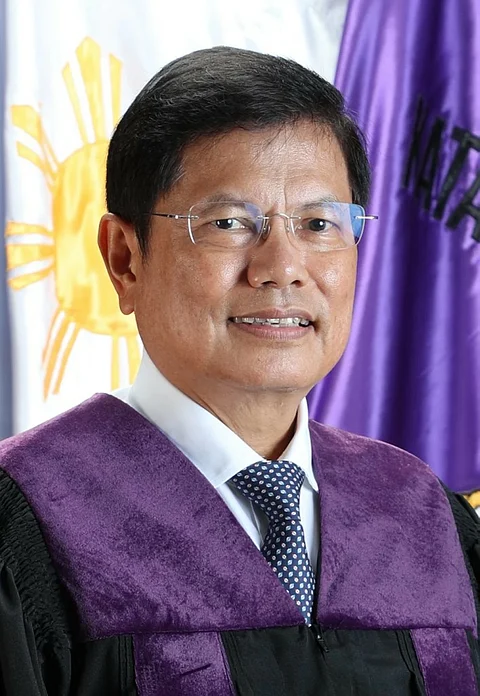
- NEWS
- the EDIT
- COMMENTARY
- BUSINESS
- LIFE
- SHOW
- ACTION
- GLOBAL GOALS
- SNAPS
- DYARYO TIRADA
- MORE

The Supreme Court on Tuesday afternoon paid tribute to Associate Justice Mario Lopez as he formally retired from the judiciary.
Chief Justice Alexander Gesmundo led the ceremony, presenting a plaque of recognition to their esteemed colleague.
“This is a plaque of recognition to our honorary,” said Chief Justice Gesmundo. “With leave of the Chief Justice, and on behalf of my colleagues, allow me to read the contents.”
Justice Lopez was honored for decades of public service and his lifelong commitment to justice.
Born in the small town of Balaoan, La Union, Lopez grew up in a modest home guided by faith and hard work. Though he initially dreamed of becoming a doctor, he pursued law at San Beda College, graduating with honors. He passed the Bar in 1980 and later earned his Master of Laws from the University of Santo Tomas.
He began his legal career in 1981 as a technical assistant at the Supreme Court, eventually rising through the ranks as judge, prosecutor, and legal officer. In 2006, he was appointed to the Court of Appeals and joined the Supreme Court in 2019 as its 185th Associate Justice.
Gesmundo praised Lopez as a man of “quiet confidence,” a mentor to fellow magistrates, and a staunch advocate of fairness, wellness, and innovation in the judiciary. He highlighted Lopez’s support for the Supreme Court’s Strategic Plan for Judicial Innovations 2022–2027 and his leadership in judicial health and wellness programs.
“Justice Lopez believed that the well-being of court employees is essential to a working justice system,” Gesmundo said. “To his team, he was like a father — calm, wise, and always ready to guide.”
Known for his mastery of criminal law, Lopez often impressed his staff with deep knowledge of legal provisions and delivered clear, insightful rulings. His writings — from court opinions to reflections — were noted for their sharp reasoning and humility.
Among his notable contributions were opinions on cases involving rape, child protection, refugee rights, and anti-pornography laws. In People vs. KBC, he helped clarify the proper charging of rape cases. In Gudson vs. Sarmiento-Flores, he affirmed that even mothers can be held accountable under the Anti-Violence Against Women and Children Act.
He also ensured Philippine laws aligned with international obligations, as seen in decisions supporting refugee naturalization. In Central Bank vs. Coloma, he cautioned against deals that could allow private corporations to circumvent land ownership laws.
Beyond the bench, Lopez dedicated years to legal education and served as chair of the 2024 Bar Examinations, one of the largest in history. He helped guide nearly 4,000 new lawyers, emphasizing ethics, humility, compassion, and service.
“Justice Lopez’s brand of justice — ethical, compassionate, and concise — is nothing short of marvelous,” Gesmundo said.
As he enters retirement, the Court wished Lopez health and continued success. The plaque was signed by the Chief Justice, Senior Associate Justice, and all members of the Court.
“There is no dissent,” Gesmundo said.
Senior Associate Justice Marvic Leonen also gave a heartfelt speech, recognizing Lopez’s dedication to justice and the country.
“Justice Lopez showed a spirit of selfless service,” Leonen said. “He made a deep and lasting impact on this Court.”
Leonen emphasized that in times of crisis, true justice must reflect fairness, truth, and duty — values Lopez embodied. He likened Lopez’s service to that of past justices who served the nation with sacrifice, such as Chief Justices Alexander Santos and Jose Corona Santos.
“In 1958, he was simply a sacrifice, and he lived his life with a spirit of service,” Leonen said. “Justice Lopez followed this same path.”
He praised Lopez for his fairness, powerful legal writing, and unwavering sense of duty.
“His pen was sharp but fair,” Leonen said. “His love for the law helped strengthen our justice system.”
Leonen concluded by saying Lopez’s decisions reflected kindness, clarity, and purpose — values future jurists should emulate.
“Today, we celebrate his honor,” Leonen said. “His legacy is one of justice, service, compassion, and excellence.”
